In the village where Amma was born, there was only one faucet for about 1000 families. At most, each person could fill only one pot of water, but that itself would require waiting from morning until night. Sometimes, we wouldn’t end up getting any water at all. Because of these experiences, if Amma ever sees water leaking from a tap, she feels like her blood is pouring in place of the water. We may think, “How can we stop wasting water? Who do we turn to for a solution?”
Amma lived without even basic amenities and witnessed the suffering of those around her. As a result, whenever she sees another person in pain, she instinctively feels the need to help them.
Nature is our mother. While our birth mother may keep us on her lap for a few years, Mother Nature keeps us on her lap for our entire lifetime.
Amma has one wish. All universities should send their students to impoverished rural villages or city slums for at least one or two months during their education. They would be able to see directly the issues and problems that the poor face. They could then develop solutions and write papers on everything they studied. This would help us to help the poor in the most effective way and, at the same time, awaken compassion in today’s youth.
Today, universities and their researchers are ranked mainly based on the amount of funding they receive, the number of papers they publish, and their intellectual calibre. Faculty are promoted according to the same criteria, as well. Along with this, we should take into consideration how much we have been able to use their research to serve the lowest and most vulnerable strata of society. This would be like gold becoming fragrant.
In our approach to sustainable development, we should not forget that it is by strengthening the people at the base of the pyramid that the entire edifice of society becomes healthy and strong.

